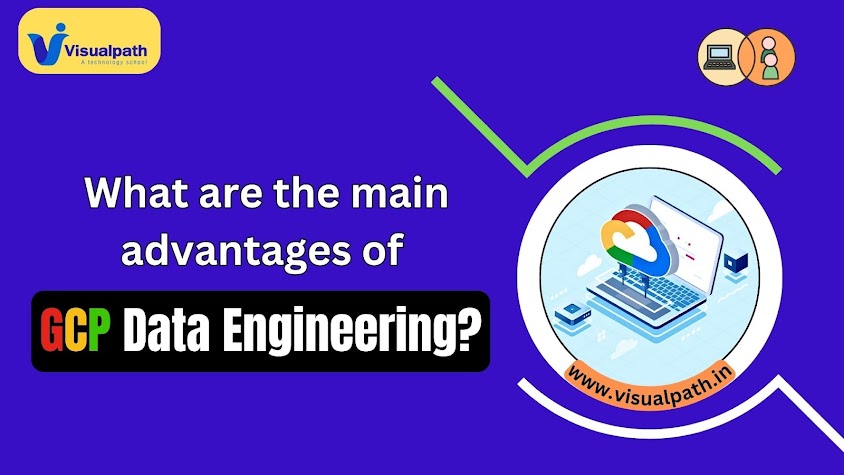What are the main advantages of GCP Data Engineering?
Advantages of GCP Data Engineering?
Google Cloud Platform (GCP) offers several advantages for data engineering, especially for businesses and individuals working with large-scale data processing, analytics, and machine learning. Here are the main benefits of GCP for data engineering: GCP Data Engineering Training
1. Scalability and Performance
GCP is designed to handle massive data workloads. Its services are scalable, which means data engineers can easily process both small and enormous datasets. Tools like BigQuery can handle petabytes of data at high speed, making it ideal for large-scale data analytics.
- BigQuery: A fully managed, serverless data warehouse that enables super-fast SQL queries using the processing power of Google’s infrastructure. It can analyze data quickly and in real-time without the need to manage the infrastructure.
2. Cost-Effective Solutions
GCP's pricing models are flexible and cost-effective, especially for data engineering projects. The pay-as-you-go model allows businesses to save costs by only paying for the resources they use.
- BigQuery’s on-demand pricing: Charges per query based on data processed, making it affordable for companies that don't have consistently large data usage. GCP Data Engineer Training in Hyderabad
3. Integration with AI and Machine Learning
Google’s strength in artificial intelligence and machine learning extends to GCP's data engineering solutions. GCP integrates seamlessly with GoogleAI tools, enabling engineers to incorporate AI/ML workflows into their data pipelines. Tools like AI Platform and TensorFlow allow data engineers to build, deploy, and manage machine learning models efficiently.
- AI and Machine Learning: GCP's built-in support for AI gives data engineers the ability to apply advanced machine learning models directly to their data with minimal effort.
4. Kubernetes and Containerization
For modern data engineering practices, containerization is essential. GCP is a leader in Kubernetes, offering Google Kubernetes Engine (GKE) to manage containerized workloads. This helps in building reproducible, scalable, and highly available data pipelines.
- GKE: Simplifies the deployment, scaling, and management of containerized applications, making it easy to run and manage data pipelines.
5. Real-time Data Processing
GCP provides powerful tools for processing data in real-time. Services like Cloud Dataflow enable developers to create real-time data pipelines for ETL (Extract, Transform, Load) processes. Dataflow is a fully managed stream and batch processing service that supports Apache Beam, allowing you to process data as it arrives.
- Cloud Dataflow: Automates resource management and is highly scalable, making it a great choice for real-time data processing. Google Cloud Data Engineer Training
6. Advanced Security
Google has a strong emphasis on security, and GCP is no different. It provides encryption by default, advanced identity management through Cloud Identity, and fine-grained access controls to ensure data privacy and protection.
- Encryption & IAM: Protects data both at rest and in transit, with options to manage encryption keys. Identity and Access Management (IAM) ensures secure access to resources.
7. Data Lake Architecture
GCP supports building highly scalable data lakes using Cloud Storage and BigQuery. This allows data engineers to store, manage, and analyze unstructured and structured data together.
- Cloud Storage: Provides unlimited, highly durable, and cost-effective storage options for data lakes.
8. Simplified Data Integration
GCP simplifies the integration of data from multiple sources. Using tools like Cloud Pub/Sub for messaging, Cloud Composer for orchestration, and Data Fusion for ETL processes, data engineers can build cohesive and complex data pipelines with ease.
- Cloud Pub/Sub: A scalable, real-time messaging service for ingesting event data from various sources into data pipelines.
Conclusion:
GCP's data engineering tools are highly scalable, cost-efficient, and integrated with advanced AI and machine learning capabilities, making it one of the best platforms for organizations that require modern, efficient, and high-performing data pipelines. With tools like BigQuery, Cloud Dataflow, and AI Platform, GCP is well-suited for handling large datasets and running real-time data analytics. Google Cloud Data Engineer Online Training
Visualpath is the Best Software Online Training Institute in Hyderabad. Avail complete GCP Data Engineering worldwide. You will get the best course at an affordable cost.
Attend Free Demo
Call on - +91-9989971070.
WhatsApp: https://www.whatsapp.com/catalog/919989971070
Blog Visit: https://visualpathblogs.com/
Visit https://visualpath.in/gcp-data-engineering-online-traning.html


Comments
Post a Comment